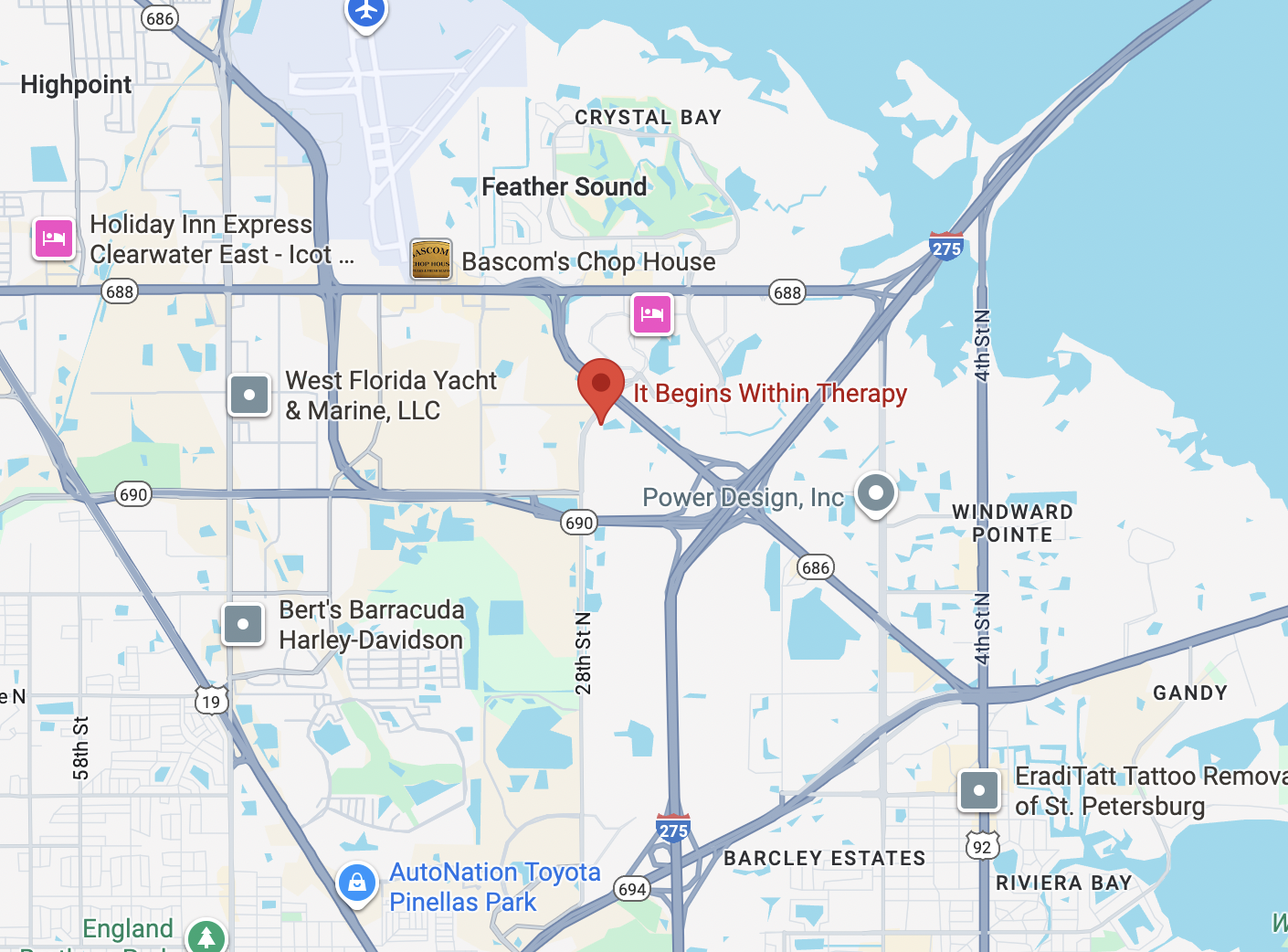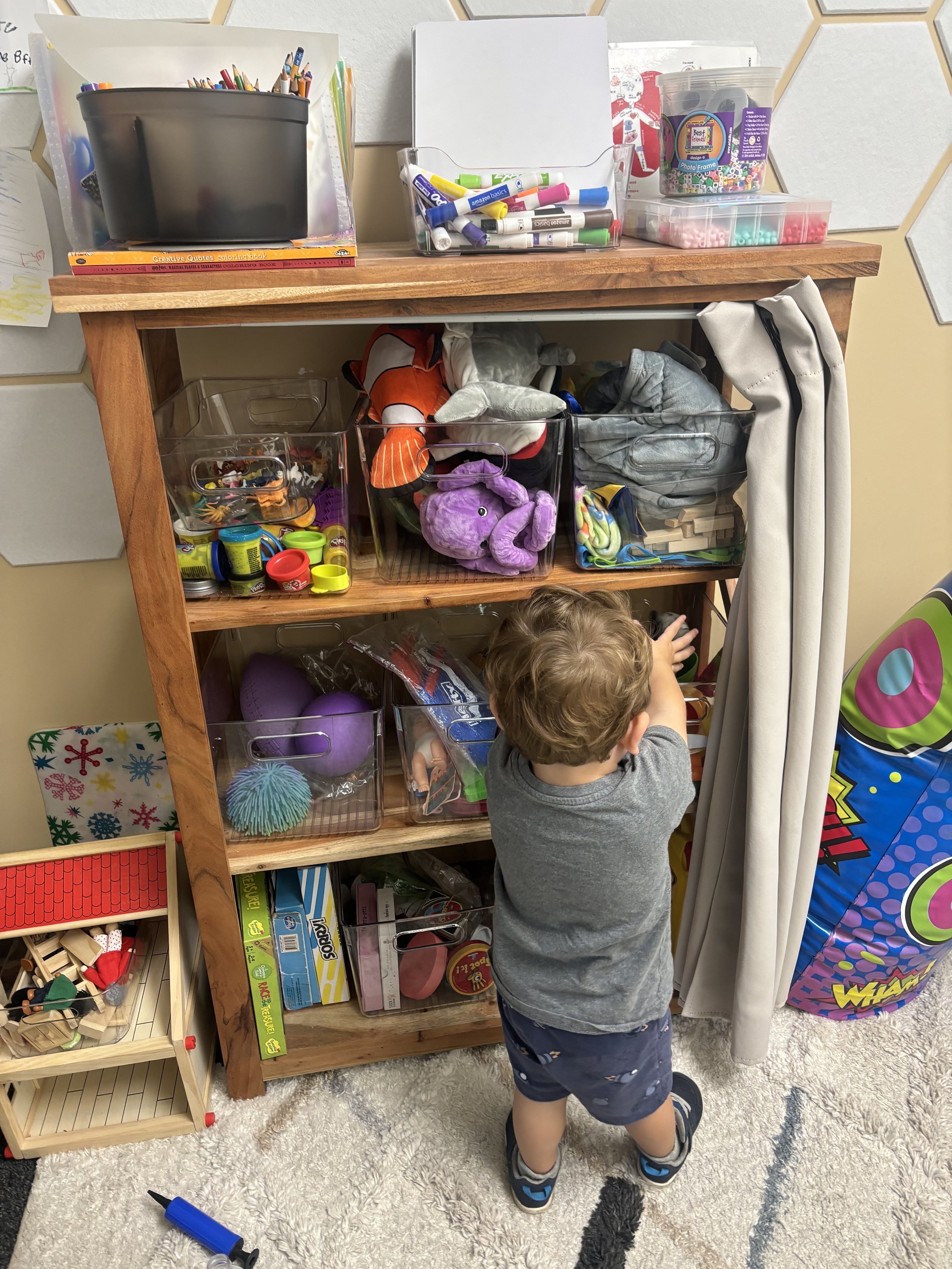Play Therapy in Tampa, St. Petersburg & Sarasota
Helping kids Heal, Grow, and thrive through therapeutic Play therapy
At IBW, we specialize in evidence-based play therapy for children aged 3 to 12. Our licensed therapists in Tampa, St. Petersburg, and Sarasota provide a compassionate and developmentally appropriate space where children can express emotions, build resilience, and overcome challenges—all through the natural language of play.
What Is Play Therapy? (And Why It Works)
Simply put, play therapy is an approach to Child Therapy, and is a structured mental health intervention that uses play to help children explore feelings and resolve emotional or behavioral challenges. Unlike adults who can express their feelings through words, kids use play to communicate their experiences and needs.
In our therapeutic playrooms, children are invited to use toys, art materials, and games to:
Process anxiety in children, grief, trauma, or therapy for behavioral challenges
Learn emotional regulation and problem-solving
Strengthen self-esteem and social skills
At It Begins Within our approach is Child-Centered, interactive, and confidential. We also emphasize providing each child a safe and trusted environment to do the important work of growing and healing.
Meet Our Play Therapists in Tampa, St. Petersburg & Sarasota
Therapeutic Play Therapy For Kids Near Me in Florida
Play therapy in Largo & st petersburg fl
Our St. Petersburg play therapy office supports children and families across Pinellas County, including Clearwater, Largo, Gulfport, Seminole, Feather Sound, and Treasure Island. Our licensed child therapists use therapeutic play, art, and games to help kids express big feelings, work through behavior challenges, and feel safer in their bodies. If your child is struggling at home or school, play therapy in St. Petersburg gives them a warm, kid-centered space to heal and grow.
play therapy in tampa
Located near Westshore and South Tampa, our Tampa play therapy office serves children and families throughout Hillsborough County, including South Tampa, Hyde Park, Carrollwood, Brandon, Riverview, and Apollo Beach. Our child-focused therapists blend evidence-based play therapy with practical parenting support to address tantrums, anxiety, ADHD symptoms, and behavior struggles. Families choose Tampa play therapy at It Begins Within when they want a trusted team to help their child feel understood, confident, and connected again.
play therapy in sarasota
Our Sarasota office provides compassionate play therapy for kids and families in Lakewood Ranch, Palmer Ranch, Siesta Key, University Park, and the greater Sarasota area. Using developmentally appropriate play, storytelling, and creative activities, our therapists help children process big life changes, worries, meltdowns, and school challenges in a way that feels natural and safe. Sarasota play therapy at It Begins Within is designed to support both children and parents, so you’re not navigating these struggles alone.
Why Play Therapy in Tampa, St. Petersburg & Sarasota
Parents may not understand why their child is sad, angry, or acting out. During a developmental play therapy session, the pediatric therapist facilitates interactive therapy sessions with the child to help develop positive ways of self-direction and appropriate coping skills.
What is the Success Rate of Play Therapy?
Play therapy has a well-established track record of success, with numerous studies showing that it significantly improves emotional, behavioral, and social outcomes for children. A widely cited meta-analysis by Bratton et al. (2005) found that play therapy is effective in approximately 75% of cases, with a large treatment effect size of 0.80. More recent research continues to support its efficacy, particularly for children dealing with trauma, anxiety, ADHD, and behavioral challenges. Outcomes are even stronger when parents are involved in the therapeutic process. Overall, play therapy is considered a highly effective, evidence-based approach for helping children ages 3 to 12 express emotions, build resilience, and develop healthier relationships.
Who Benefits from Play Therapy?
Do You Treat Toddlers and Children Under 5?
Yes. We offer toddler play therapy using simplified, developmentally adjusted methods tailored for younger children.
Therapeutic Play for Neurodivergent Kids
At IBW, we provide play therapy tailored to the unique needs of neurodivergent and autistic children. Our therapists are experienced in supporting children with autism spectrum disorder (ASD), ADHD, sensory processing differences, and other developmental variations.
Through a strengths-based, sensory-aware approach, we create a calming, structured play environment that meets your child where they are—emotionally and developmentally.
play therapy for autistic and neurodivergent children helps:
Support emotional regulation and reduce sensory overwhelm
Build communication and social interaction skills
Foster self-expression through visual, tactile, and imaginative play
Encourage flexibility, routine comfort, and trust in the therapeutic relationship
We collaborate closely with parents and caregivers to reinforce progress at home and ensure therapy is responsive to your child’s evolving needs.
While play therapy is primarily intended for children ages 3-12, it has also been proven to strengthen the parent-child relationship, benefiting parents and caregivers. Play therapy can support kids facing multiple challenges and diagnosis’, including:
Emotional distress like sadness, anxiety or mood swings
Challenging behaviors such as aggression, defiance or withdrawal
Traumatic events, including sexual abuse, family violence and medical issues
Life transitions which include divorce, grief and relocation
Developmental delays or neurodiversity
We also offer specialized services for toddlers, pediatric clients, and preteens who benefit from a modified and developmentally appropriate support. Play therapists (child therapists trained in play therapy) meet children where they are developmentally, as many young children do not possess cognitive skills.
What Happens During a Kids Play Therapy Session?
Before meeting the child, the therapist will meet with the parents or guardians to learn more about the child and to explain play therapy. A Pediatric play therapist can also work with the parent to help support the guardian with emotional and behavioral challenges in the home and school settings. The clinicians role includes helping to improve parenting skills to support the work being done with the child in addition to strengthening the treatment.
kinds of play therapy used at it begins within therapy in sarasota, st. petersburg & Tampa, florida
At It Begins Within, our child therapists incorporate a variety of play therapy techniques tailored to your child's needs, helping them manage challenges like anxiety, behavioral issues, ADHD symptoms, or trauma in a safe, non-verbal way. These methods draw on proven strategies from child psychology, promoting emotional regulation, self-awareness, and resilience. Sessions are fun and interactive, often lasting 45-60 minutes, with parents involved as needed for family support.
Our play therapy may include:
Imaginative Role-Play or Storytelling: Children use puppets, dolls, or props to act out scenarios, helping them explore feelings, resolve conflicts, and practice social skills. This technique, like puppet interviews or pretend play, encourages emotional expression and problem-solving in a low-pressure environment.
Drawing, Painting, and Sensory Activities: Through art materials like crayons, clay, or sensory bins, kids externalize thoughts and emotions they may struggle to verbalize. Activities such as "feeling faces" or Play-Doh volcanoes help with anxiety reduction and sensory integration, fostering creativity and self-esteem.
Sand Tray Therapy: Using a tray of sand and miniature figures, children create scenes representing their inner world, aiding in trauma processing and symbolic communication. This non-directive method is particularly effective for building narratives around difficult experiences.
Use of Therapeutic Games and Toys: Board games like Uno or Jenga, puzzles, building blocks, or fidget tools promote focus, turn-taking, and emotional discussions. These activities enhance executive function, social interaction, and coping strategies while making therapy enjoyable.
Benefits of These Play Therapy Activities
Incorporating these techniques helps children develop better emotional insight, reduce behavioral challenges, and improve relationships at home and school. Research shows play therapy can lead to significant improvements in symptoms, with many kids showing progress in as few as 12-16 sessions. If you're searching for "play therapy activities for kids" or "how play therapy helps children," our approach is designed to deliver lasting results. Contact us today to schedule a session in Tampa, St. Petersburg, or Sarasota.
Each session is guided by a play therapist who is trained to
Observe the child’s patterns in play
Reflect emotions and themes back in safe, accessible language
Gently guide children toward insight, self-regulation, and healing
Helping Children Feel Empowered to Control Their Emotions
During a pediatric play therapy session, the child will work on identifying and expressing emotions through play. The child learns healthy coping skills to manage their emotions and communicate in ways that benefit the child and the parent.
Play therapy is a therapeutic approach primarily designed for children, typically between the ages of 3 and 12, but it can also be beneficial for adolescents and even some adults. This form of psychotherapy recognizes that children may struggle to express themselves verbally in the same way as adults. Instead, play therapy uses play as a natural medium for communication, allowing individuals to convey thoughts, emotions, and experiences through toys, games, and creative activities.
Play therapy serves three fundamental functions
Expression of Emotions: Through play, children can express complex emotions and experiences that may be challenging to verbalize. Play becomes a natural language for them to communicate their feelings, helping therapists gain insights into their inner world.
Catharsis and Healing: Play therapy provides a safe space for children to release pent-up emotions, facilitating emotional catharsis. Engaging in therapeutic play allows children to process and make sense of their experiences, contributing to healing and emotional well-being.
Skill Development: Play therapy for kids develops and enhances various skills, including emotional regulation, problem-solving, social interactions, and communication. Therapists use play as a tool to teach and reinforce positive behaviors, coping mechanisms, possess control over emotions, and adaptive skills crucial for healthy development.
The Parent’s Role in Play Therapy
Parent and caregiver involvement plays a crucial role in your child’s progress. At IBWHC, we begin every play therapy journey with a parent consultation to better understand your child’s emotional world, family dynamics, and daily environment.
Throughout treatment, our therapists provide regular updates, guidance, and optional coaching sessions. This helps reinforce growth between sessions and ensures that your child receives consistent support both in and outside the therapy room.
Can Parents Attend Play Therapy Sessions?
In most cases, play therapy sessions are held one-on-one with the child. This protected space allows the therapist to build trust and promote emotional safety.
However, parent involvement is woven into the treatment process through:
Scheduled check-ins with the therapist
Collaborative planning and progress reviews
Occasional joint sessions when therapeutically appropriate
The Family’s Influence on Child Therapy
While play therapy focuses primarily on the child, we recognize that family dynamics significantly impact a child’s emotional and behavioral health. That’s why we work with parents and caregivers to create a stable, nurturing environment at home.
When needed, we may also recommend family therapy to address broader relational patterns, enhance communication, and support long-term outcomes for the entire household.
Finding a Play Therapist for Your Child in Tampa, Largo, St. Pete & Sarasota
Choosing the right therapist for your child is an incredibly important decision. At IBW, we combine clinical expertise with a warm, child-centered approach to help your family feel confident and supported from the start.
Why families trust our play therapy team
Licensed & Certified Specialists
All sessions are led by licensed therapists with advanced training in child development, trauma-informed care, and play therapy models.Therapeutic Playrooms in Tampa & St. Petersburg, Florida
Our offices are designed with children in mind—safe, welcoming, and developmentally appropriate environments that support meaningful therapeutic work.Evidence-Based Treatment Models
We use proven approaches like Child-Centered Play Therapy, Filial Therapy, and other research-supported interventions tailored to your child’s needs.Family-Centered Treatment Plans
Therapy includes clear, collaborative goals and regular communication with caregivers to reinforce progress at home.
Are your play therapists certified?
Yes. Our clinicians are licensed professionals with advanced training in play therapy and child-focused interventions.
What Problems Does Play Therapy Help With?
Many parents come to us saying things like:
“My child has daily tantrums and nothing seems to help.”
“My 5-year-old is overwhelmed by big feelings.”
“My child refuses school and melts down every morning.”
“My child is anxious, clingy, or afraid to sleep alone.”
Play therapy gives children a safe, developmentally appropriate way to express what they don’t yet have words for. At IBWHC, our licensed child therapists help kids work through a wide range of emotional and behavioral challenges, including:
Play Therapy is Used to Treat Children Experiencing:
Children come to us from across Tampa, St. Petersburg and Sarasota with a wide range of emotional and behavioral needs which can benefit from therapeutic play therapy. Play therapy can help with tantrums and big feelings, including explosive reactions, frequent meltdowns, difficulty calming down, or becoming easily overwhelmed. We also frequently support children with emotional regulation challenges, such as trouble identifying feelings, managing impulses, recovering from upsets, or navigating transitions.
Our therapists work with children experiencing ADHD symptoms, including impulsivity, frustration, restlessness, difficulty following directions, and emotional outbursts. We help children with anxiety and worries, such as separation fears, clinginess, excessive worrying, perfectionism, bedtime fears, and overthinking.
Play therapy is also effective for school refusal and academic stress, including morning meltdowns, avoidance, stomachaches before school, fear of being away from parents, and peer-related challenges. We support children experiencing nightmares and sleep disturbances, including fear of sleeping alone, recurring bad dreams, nighttime anxiety, and difficulty settling down.
We also support children who are faced with:
Behavioral concerns such as aggression, defiance, acting out, sibling conflict, and difficulty following routines.
Family transitions and stressors, including divorce, new siblings, relocation, grief, or major changes at home.
Developmental or neurodivergent differences, such as sensory needs, social challenges, speech delays, or behavioral responses related to neurodiversity.
Is play therapy effective for trauma?
Yes. Play therapy is a research-supported treatment for trauma and has been shown to help children reduce emotional distress and behavioral symptoms.
What does it cost?
At IBW our standard rates are $160 for a 60-minute play therapy session, and $215 for 60-minute family sessions. We also provide a limited amount of sliding scale options.
does play therapy work?
Play therapy is one of the most effective, evidence-based treatments for children, especially ages 3–12. Research from the Association for Play Therapy and multiple meta-analyses shows that children in play therapy experience significant improvements in emotional regulation, behavior, communication skills, and coping abilities.

Start Your Child’s Healing Journey Through Play Therapy in Tampa & Beyond
Book a free Play Therapy consultation in Tampa, St. Petersburg or Sarasota today to learn about how to build your child’s self-esteem, improve problem-solving, and strengthen your relationship with your child.
















